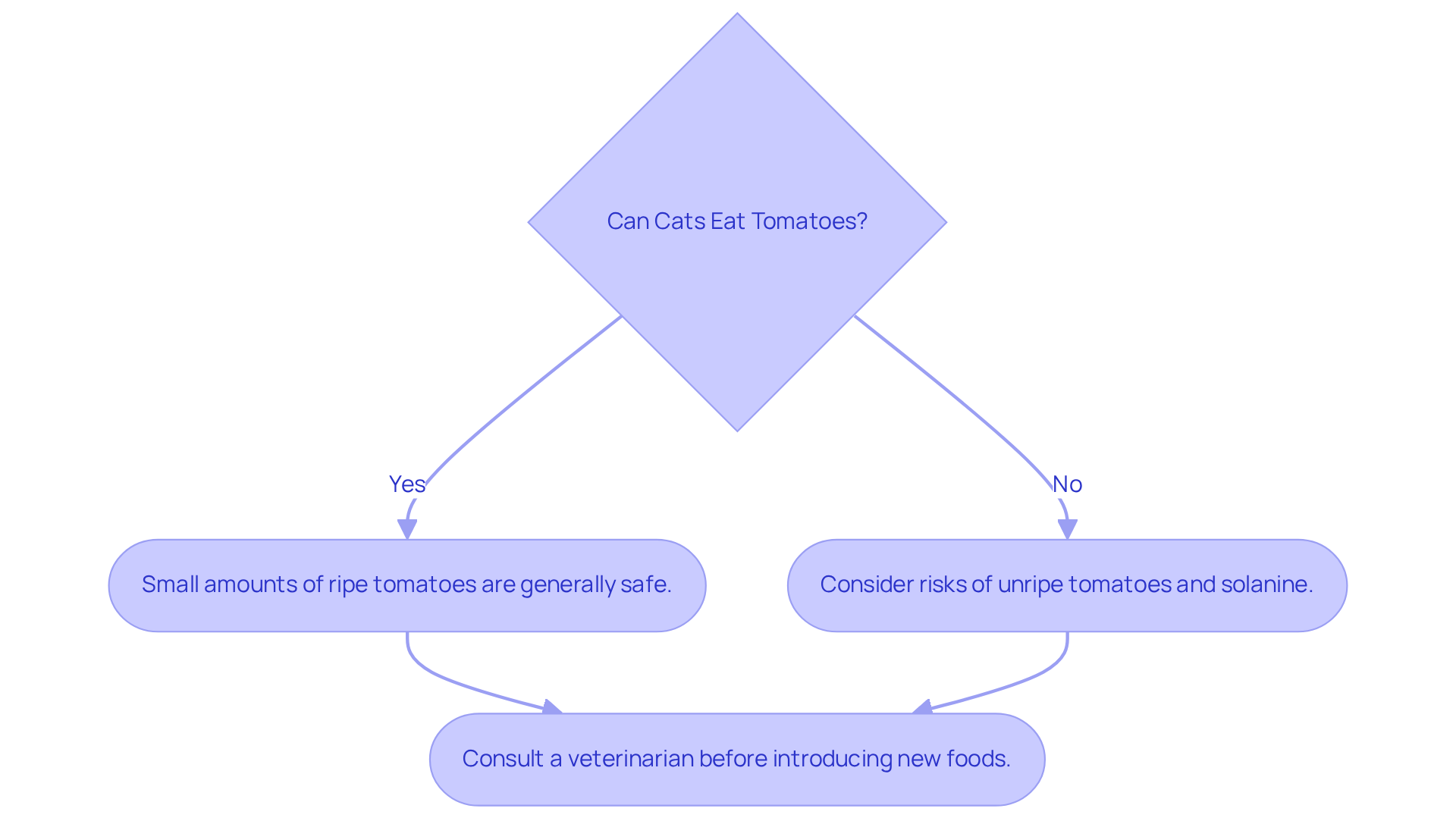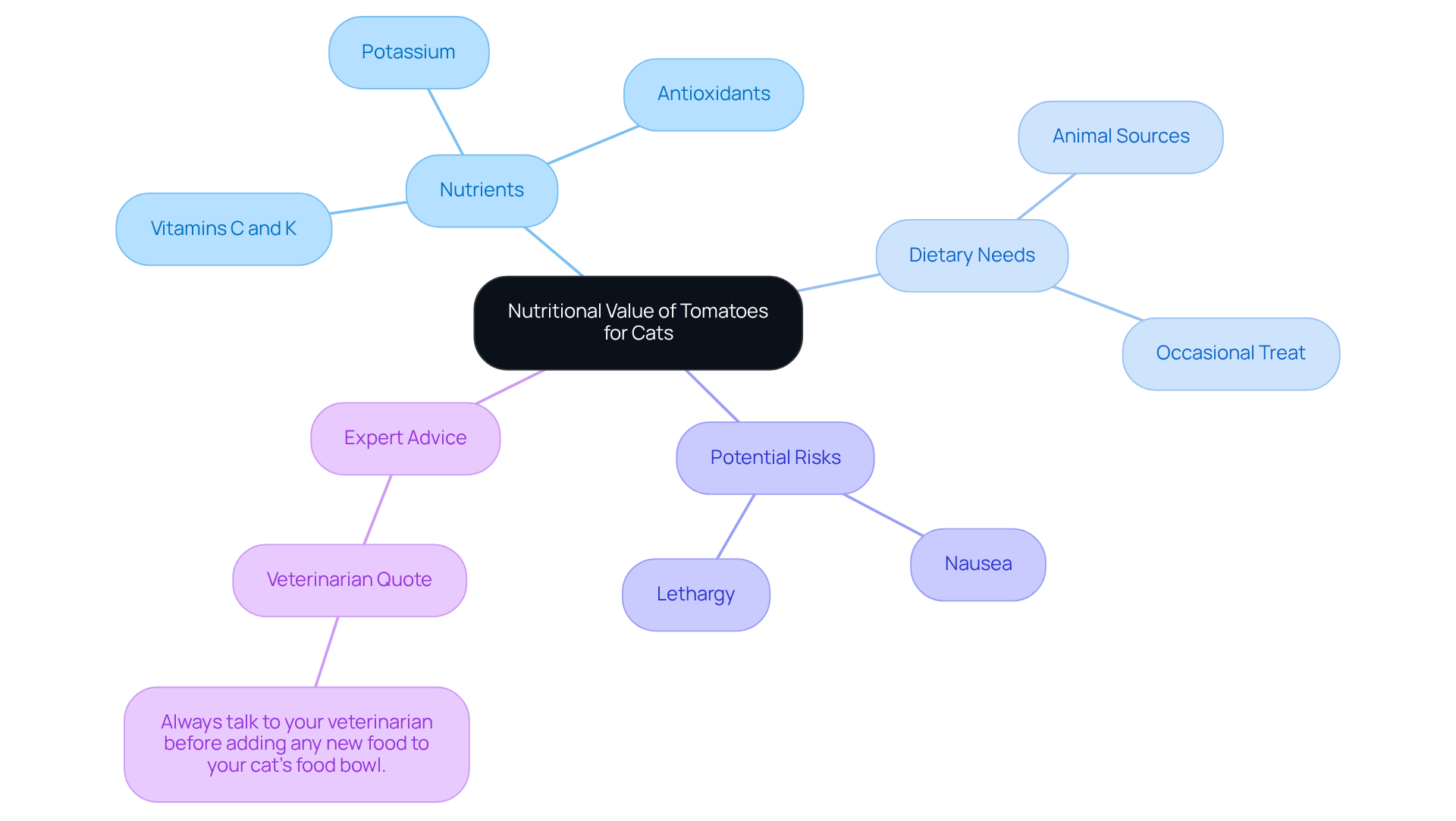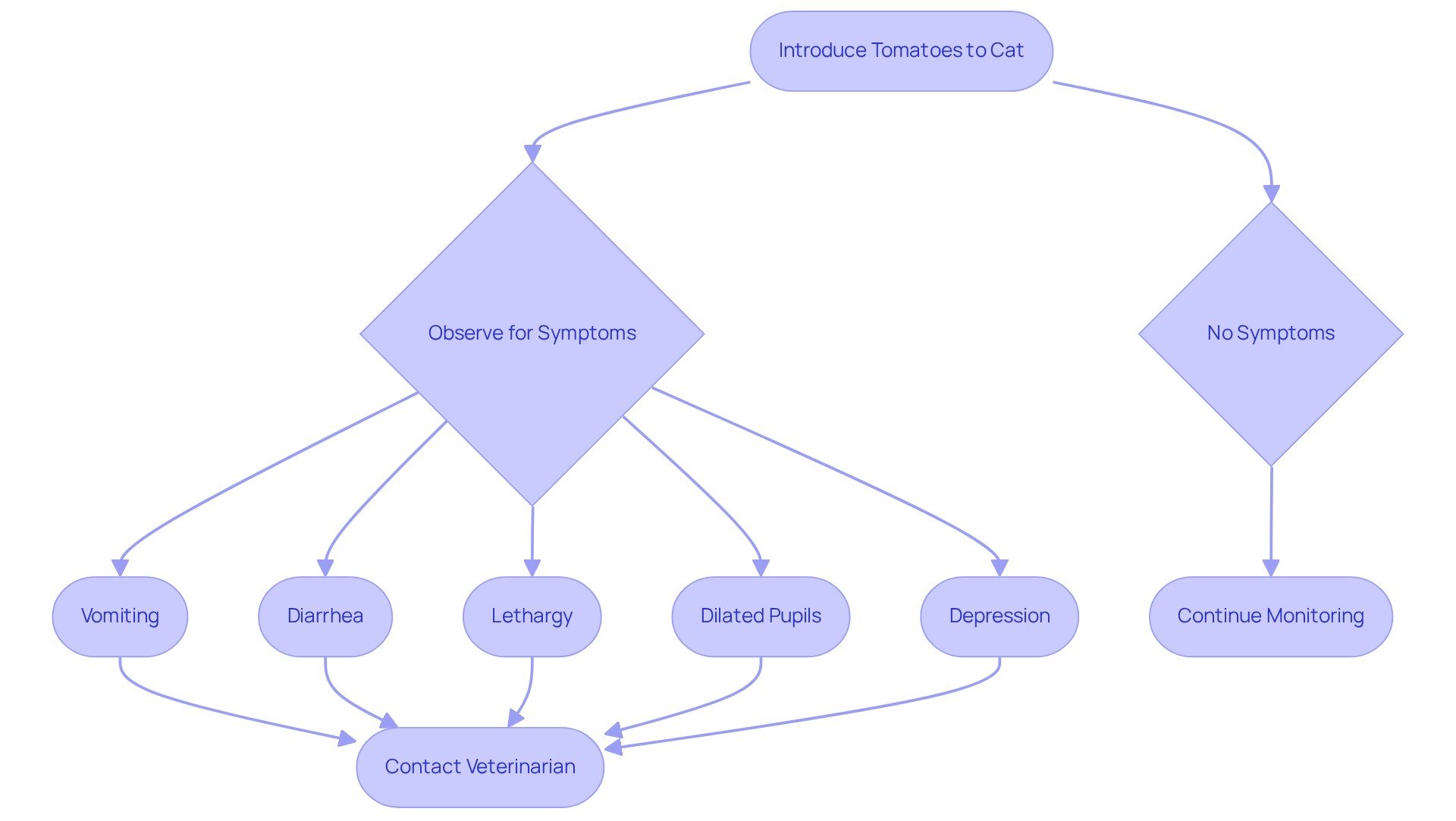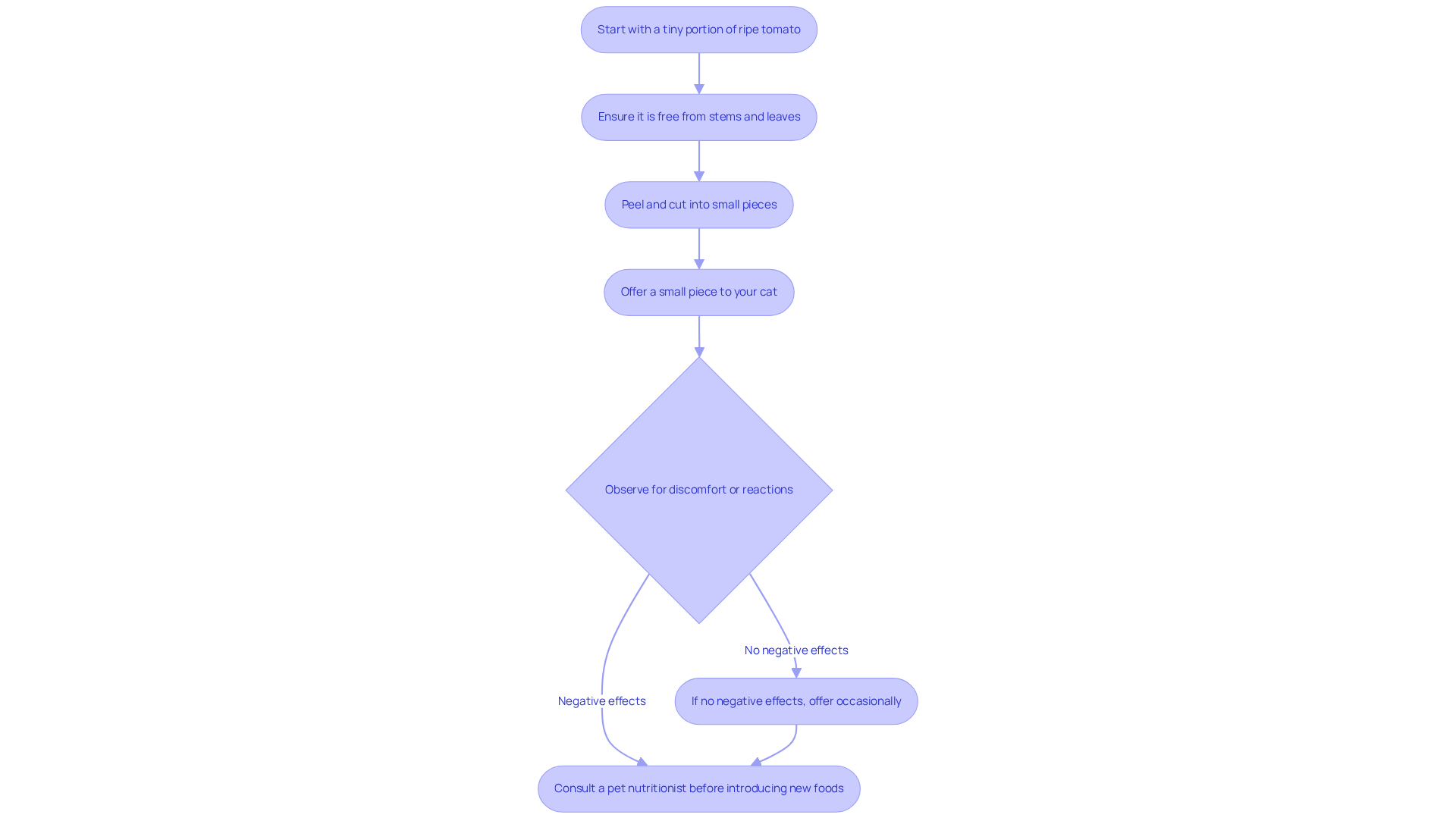
Can Cats Eat Tomatoes? Understanding Risks and Benefits
Overview
As a loving cat owner, you may wonder about the safety of feeding your feline friend tomatoes. It’s important to know that while cats can eat ripe tomatoes in very small amounts, caution is essential. Unripe tomatoes and other parts of the plant can pose potential toxicity risks, which can understandably cause concern for your pet’s health. Though ripe tomatoes may offer minimal benefits, they should never replace a balanced, meat-based diet that is crucial for your cat’s well-being.
When introducing any new food into your cat’s diet, it’s best to do so under the guidance of a veterinarian. This ensures that you are making informed choices that prioritize your cat’s health and safety. Remember, your furry companion relies on you for care and nourishment, and seeking professional advice is a nurturing step towards ensuring their happiness and vitality.
Introduction
As pet owners, our curiosity often drives us to explore new dietary options for our beloved feline companions. One common question that arises is whether cats can safely enjoy tomatoes. While ripe tomatoes may provide some hydration and minimal nutritional benefits, it’s essential to recognize the inherent risks associated with certain parts of the plant and unripe fruit.
This article seeks to navigate the complexities of incorporating tomatoes into a cat’s diet, carefully addressing both the potential advantages and the critical precautions that every caring cat owner should consider.
As we delve into this topic together, we might wonder: can the occasional tomato treat coexist with a cat’s primarily meat-based nutritional needs, or does it pose more danger than delight? Let’s explore this together, keeping our furry friends’ well-being at the forefront of our minds.
Define the Relationship: Can Cats Eat Tomatoes?
As a loving cat owner, you may wonder, can cats eat tomatoes safely when incorporating ripe fruits from the nightshade family into your feline’s diet, particularly the red varieties? While small amounts of mature fruit are generally safe, it’s essential to remember that can cats eat tomatoes, as they are obligate carnivores thriving on a diet primarily composed of meat. While a rare piece of ripe fruit might not pose a danger, it’s important to consider can cats eat tomatoes before making it a regular feature in their meals. Instead, the focus should remain on providing a balanced, meat-based nutrition plan that supports their overall health and well-being.
Many cat owners, like yourself, often consider adding vegetables to their pets’ diets. However, it’s important to recognize that the primary nutritional needs of cats revolve around animal protein. While incorporating vegetables can be beneficial, it should be done sparingly and with an awareness of potential risks. For instance, although ripe fruits are not toxic, certain plant varieties and unripe fruits, which raises the question of can cats eat tomatoes, may contain solanine that can be harmful. If ingested, symptoms of toxicity may include nausea and lethargy, warranting immediate veterinary attention.
Experts in feline nutrition emphasize that while some vegetables can offer health benefits, they should never replace the essential nutrients found in meat. Dr. Ernie Ward reminds us, “Cats flourish on a nutrition plan high in protein, with minimal carbohydrates.” Therefore, any vegetable, including fruit from the nightshade family, should only serve to enhance a balanced meal plan that meets your cat’s unique nutritional needs. Moreover, it’s crucial to consult with a veterinarian before introducing new foods into your cat’s diet, ensuring their safety and health remain a top priority.

Nutritional Value of Tomatoes for Cats
As a loving pet owner, you may be concerned about the nutritional needs of your feline friend. While tomatoes are known for being rich in vitamins like C and K, along with potassium and antioxidants, it’s important to remember that these nutrients offer minimal benefits for cats, leading to the question of whether can cats eat tomatoes. Cats primarily thrive on a diet of animal sources, making up about 90% of their nutritional intake from well-balanced cat food. Although tomatoes can provide some hydration due to their high water content, it’s essential to know if can cats eat tomatoes, as they should be viewed as an occasional treat rather than a dietary staple.
It’s crucial to acknowledge that even small amounts of certain plants can pose risks to our beloved pets, potentially leading to symptoms such as nausea and lethargy. As Dr. Sandra C. Mitchell, DVM, wisely advises, “Always talk to your veterinarian before adding any new food to your cat’s food bowl.” This step ensures that your furry companion remains healthy and happy.
Furthermore, be cautious with vegetable soup, as it often includes added herbs and spices that may not be safe for cats. Your dedication to your pet’s well-being is commendable, and taking these precautions will help you make informed choices that prioritize their health and happiness.

Identify Risks: Toxicity and Health Concerns
Mature fruit can be safe for your beloved feline companions, but it’s important to approach this delicately. While fully ripe tomatoes may be offered in very limited quantities, caution is paramount due to the presence of solanine in unripe fruit, as well as in the leaves and stems of the plant, leading to the question of whether can cats eat tomatoes. Solanine is a toxic compound that can lead to gastrointestinal distress and neurological symptoms in cats, which can be quite distressing for both pets and their owners. Symptoms of solanine poisoning may include:
- Vomiting
- Diarrhea
- Lethargy
- Dilated pupils
- Depression—signs that necessitate immediate veterinary attention.
As a caring pet owner, it’s crucial to provide only the tiniest portions of plain, fully ripe, red fruit, while strictly avoiding any parts of the plant, particularly when questioning can cats eat tomatoes. After introducing fruit into your cat’s diet, it’s wise to observe for any negative reactions. If your furry friend shows signs such as drooling or nausea after contact with plant matter, even minor quantities can provoke clinical signs of toxicity, so reaching out to a veterinarian is essential.
Additionally, ensuring that tomatoes are free from harmful additives is vital, as many products derived from them do not contribute positively to a cat’s nutrition and can lead to gastrointestinal upset. Your commitment to your pet’s well-being is commendable, and by taking these precautions, you can help ensure that your feline family member stays safe and healthy.

Guide to Safely Introducing Tomatoes to Your Cat’s Diet
To safely find out if cats can eat tomatoes, it’s important to start with a tiny portion of ripe fruit, ensuring it is free from stems and leaves. Peeling the tomato and cutting it into small, manageable pieces can help prevent any choking hazards. After offering a small piece, closely observe your cat for any signs of discomfort or adverse reactions. If your cat enjoys the taste and shows no negative effects, you can occasionally provide small servings as a treat.
However, it’s essential to remember that these fruits should never replace a balanced, meat-based diet, and prioritizing your cat’s primary nutritional needs is crucial. With 86% of pet owners shopping for their pets online, there’s a growing interest in diverse dietary options. Additionally, veterinarians recommend consulting with a pet nutritionist before introducing new foods, including tomatoes, to determine if cats can eat tomatoes and to ensure they meet your cat’s specific dietary requirements.
Always prioritize your cat’s health by being cautious with any new food introductions, as your furry friend deserves the best care possible.

Conclusion
Understanding whether our beloved cats can safely enjoy tomatoes is a concern that many pet owners share. It’s important to carefully consider their dietary needs and the potential health risks involved. While ripe tomatoes can be offered in small amounts as an occasional treat, we must remember that a meat-based diet is essential to meet a cat’s nutritional requirements. Cats are obligate carnivores, and their health thrives on high-quality animal protein. Thus, it’s vital to prioritize this aspect of their diet over the inclusion of fruits and vegetables.
The discussion around cats consuming tomatoes brings to light several crucial points, particularly regarding the potential toxicity of unripe tomatoes and the harmful parts of the plant. It’s always wise to consult with a veterinarian before introducing any new foods, including tomatoes, into a cat’s diet. Although ripe tomatoes may provide some hydration and minimal nutritional benefits, they should never take the place of the essential nutrients found in a balanced diet specifically designed for our feline friends.
In conclusion, caring for our cherished pets requires diligence and informed decision-making. While small amounts of ripe tomatoes can be safely introduced, it’s imperative to stay vigilant about potential risks and to prioritize a well-balanced, protein-rich diet. By taking these precautions and engaging with veterinary professionals, we can make thoughtful choices that not only enhance our pets’ diets but also protect their overall well-being. Remember, your commitment to your cat’s health is the best gift you can give them.
